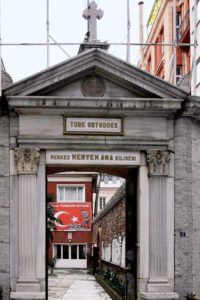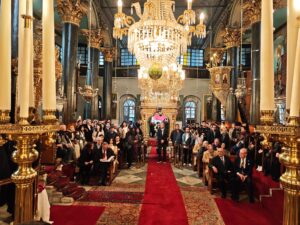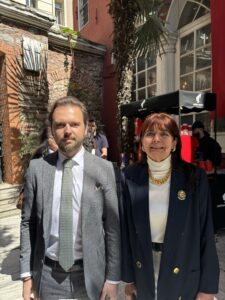Abdullah Bozkurt / Stockholm
A militant neo-nationalist faction in Turkey known as the Ulusalcılar — or Eurasianists (Avrasyacılar) — has intensified its campaign of harassment and intimidation of the country’s shrinking Greek Orthodox and Catholic communities. The group, long associated with violence and benefitting from impunity, has been allied with President Recep Tayyip Erdogan since 2014, enjoying protection and political cover.
Most recently, the group mobilized to protest a commemoration event planned by the Orthodox Christian world to mark the 1,700th anniversary of the First Council of Nicaea, a historic gathering that took place in 325 AD in what is now the city of İznik.
The council was foundational for Christian doctrine, producing the Nicene Creed and resolving key theological disputes of the early Church. The late Pope Francis had previously announced plans to attend the 2025 commemoration in İznik, a move that further inflamed the neo-nationalist group.
Sevgi Erenerol, a prominent neo-nationalist figure and long-time provocateur, addressed the crowd during a protest held May 9 in İznik city center. Convicted in the past for her involvement in terrorist plots but later released under Erdogan’s government, Erenerol declared that participants in the commemoration were “enemies of Turkey.”
“Those who dream of a council in İznik, hand-in-hand with the pope and Fener [Ecumenical Patriarch Bartholomew], are undermining the Turkish state and pursuing imperialist fantasies!” she shouted to supporters.
Erenerol is affiliated with the so-called Independent Turkish Orthodox Patriarchate (Bağımsız Türk Ortodoks Patrikhanesi) — a pseudo-church with no recognized congregation, long linked to Turkey’s intelligence services. The institution was founded in 1922 by Papa Eftim I (born Pavlos Karahisaridis, later Zeki Erenerol), Sevgi Erenerol’s grandfather, and is now headed by her brother, Paşa Ümit Erenerol, who styles himself as Papa Eftim IV.
Despite its lack of legitimacy within global Christianity, the Turkish Orthodox Patriarchate continues to operate thanks to backing from elements of what is described as Turkey’s “deep state,” including intelligence, military figures and politically connected business interests.
At the same rally, Dilek Çınar, provincial chairman of the neo-nationalist Vatan (Homeland) Party (formerly the Labor Party) in Bursa, echoed Erenerol’s rhetoric, claiming that the Ecumenical Patriarchate in Istanbul functions as a CIA outpost. “We oppose the politically charged, separatist gathering that the pope and the Fener Greek Patriarchate seek to hold in İznik,” he said, adding that the patriarchate sows sedition and operates as a hostile entity in Turkey.
The İznik protest is part of a broader defamation campaign targeting the Ecumenical Patriarchate and the Vatican. Neo-nationalist media outlets such as Aydınlık, Ulusal TV and Veryansintv.com have amplified xenophobic narratives, portraying Christian institutions as foreign agents and existential threats to Turkish unity.

In a show of force that alarmed observers, former brigadier general Veli Küçük — one of the most controversial figures in Turkish military history — appeared as a VIP guest at a recent gathering at the Turkish Orthodox Patriarchate in April. Küçük, who has avoided the public eye since his release from prison in 2014, was photographed in the front row and praised by the group’s leadership.
Küçük is notorious for founding JİTEM, a shadowy intelligence unit within the Turkish Gendarmerie, implicated in extrajudicial killings and enforced disappearances, particularly in Turkey’s Kurdish southeast.
Court documents from 2009 reveal that Küçük orchestrated a hand grenade attack on the Cumhuriyet newspaper’s Istanbul office and a deadly shooting at the Council of State, which killed a senior judge — acts carried out as part of a broader campaign to manipulate the national discourse and advance the group’s agenda.
Intercepted wiretaps showed he even threatened to bomb the US and Israeli embassies. Between 2008 and 2013, court proceedings against neo-nationalist figures like Küçük and Erenerol also exposed the Turkish Orthodox Patriarchate as a covert meeting ground for plotting violence and destabilizing operations. It was also revealed that Erenerol regularly briefed high-ranking Turkish military officials on supposed threats from Christian missionaries and the Ecumenical Patriarchate.

The group’s hostility toward the Ecumenical Patriarchate intensified following its recognition of the independent Ukrainian Orthodox Church in 2018. Erenerol responded by filing a criminal complaint against Patriarch Bartholomew I and 12 synod members, accusing them of being US puppets and separatists. Although an Istanbul court dismissed the complaint, Erenerol vowed to continue her campaign.
This pattern of incitement has previously led to deadly consequences. In 2007 Erenerol and her allies orchestrated a smear campaign against Turkish-Armenian journalist Hrant Dink, who was later assassinated. Prior to his murder, she led protests and physical attacks against him outside the courthouse where he was on trial for insulting “Turkishness.” She even joined a suit against him.
Erenerol was detained on January 22, 2008, and convicted in 2013, receiving a life sentence from the Istanbul 12th High Criminal Court. Yet, like Küçük, she benefited from legislative changes enacted by the Erdogan government, which led to retrials and acquittals. Key judges and prosecutors involved in the original cases were removed, and Erenerol walked free.
Now, reinvigorated and politically shielded, she and her neo-nationalist buddies continue to wage a virulent campaign against Christian institutions in Turkey — particularly the Ecumenical Patriarchate and the Vatican — posing a renewed threat to religious minorities and Turkey’s fragile social fabric.













